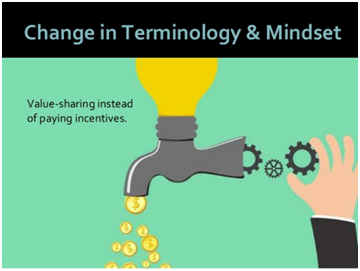 In Part 1, we introduced the idea of thinking about incentive compensation in a different way.
In Part 1, we introduced the idea of thinking about incentive compensation in a different way.
- Organizations with high performance cultures are recognizing that the most effective approach to variable compensation approach is one that embraces VALUE SHARING. These companies are replacing the idea of “incentive compensation” with “value-sharing compensation.”
- Under this shift in thinking, the company’s philosophy regarding pay is:
- “We share value with those who help create value, And the more value you create, THE MORE we’re willing to share.”
Here in Part 2, we’ll provide additional information about a Value Sharing approach to variable compensation.
Some key questions for you to ask about value sharing approach
- How should we balance our short and long-term value-sharing?
- Should all employees participate in both long and short-term value sharing?
- Should that balance differ from one employee “tier” or “family” (e.g., manager, supervisor, technical, etc.) to another?
- What form should our long-term value-sharing take—stock, phantom equity, profit pool, strategic deferred compensation or something else?
Some key concepts of the value sharing approach
- There should be both a short-term value sharing plan and a long-term one—two separate plans, but working in concert with one another.
- Without both, your organization runs the risk of over emphasizing either short or long-term priorities.
- The company establishes a threshold amount of added value that must be achieved before any value created is shared with employees.
- This is sometimes referred to as “productivity profits”.
- The plans should be self-financed.
- This means that value is paid out of the value that has been created above the threshold.
- A decision that is company-specific is whether the amount of dollars to be shared with employees is before or after deducting the related expenses.
If you need a service of a chiropractor, discover now order cialis online you need to know some of the useful tips on how to get rid of tinnitus, or ringing in the ears.
CLOSING THOUGHTS
- We live in a business age when many previous norms and paradigms are being challenged and re-thought.
- This certainly includes those that apply to compensation generally and incentive plans specifically.
- Organizations with high growth ambitions will need to adopt a pay philosophy that demonstrates the business’s commitment to turning their employees into growth partners.
- This means that all stakeholders benefit from the wealth multiple they help drive.
- The sooner you make the shift to value creation based rewards, the better off you will be.
For more information:
- E mail Trinity at info@TrinityHR.net
- Visit our website at www.TrinityHR.net
- Call us at 856.905.1762 or toll free at 877.228.6310
You have HR opportunities…Trinity has paths forward!